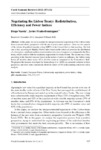Negotiating the Lisbon Treaty : Redistribution, Efficiency and Power Indices

Use este enlace para citar
http://hdl.handle.net/2183/13820Coleccións
- Investigación (FEE) [927]
Metadatos
Mostrar o rexistro completo do ítemTítulo
Negotiating the Lisbon Treaty : Redistribution, Efficiency and Power IndicesData
2012Cita bibliográfica
Czech Economic Review 6 (2012) 107–124 Diego Varela & Javier Prado-Dominguez, 2012. "Negotiating the Lisbon Treaty: Redistribution, Efficiency and Power Indices," Czech Economic Review, Charles University Prague, Faculty of Social Sciences, Institute of Economic Studies, vol. 6(2), pages 107-124, July.
Resumo
[Abstract] In this paper, we try to explain the intergovernmental negotiation of the Lisbon treaty
from a rational choice perspective with the aid of power index analysis. There are two aspects
of the reform of qualified majority voting (QMV) in the Council that we find puzzling. The first
one is that, according to Shapley-Shubik index based on the notion of power as the distribution
of a fixed prize, small and medium-sized member states have lost power as compared to the Nice
treaty, which conflicts with the unanimity requirement for treaty reform. The second one is that,
according to the Banzhaf measure based on the notion of power as influence, the Lisbon treaty
leaves all member states worse off in absolute terms as compared to the Convention’s draft.
We propose the measure developed by Steunenberg et al. (1999) as a possible solution to these
paradoxes, and draw some conclusions about the nature of EU policy making and power index
analysis.
Palabras chave
Council
European Union
Lisbon treaty
Negotiation
Power index
Voting
European Union
Lisbon treaty
Negotiation
Power index
Voting





